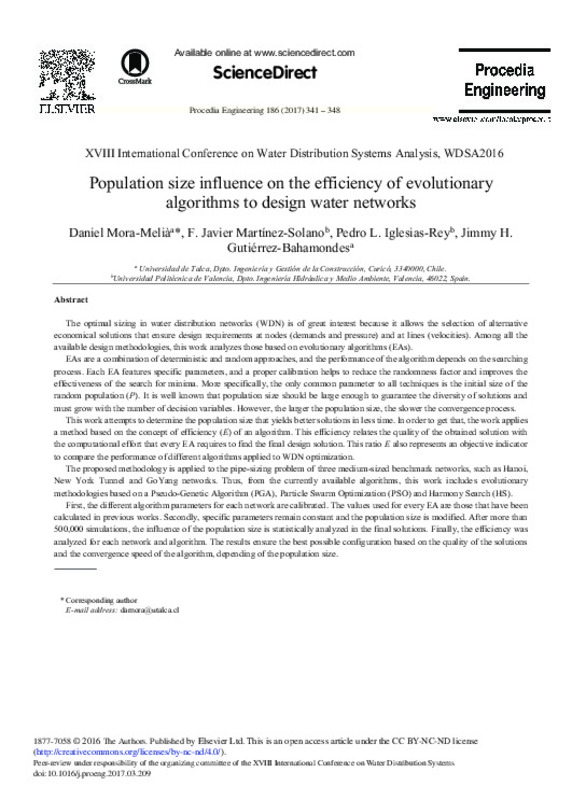JavaScript is disabled for your browser. Some features of this site may not work without it.
Buscar en RiuNet
Listar
Mi cuenta
Estadísticas
Ayuda RiuNet
Admin. UPV
Population size influence on the efficiency of evolutionary algorithms to design water networks
Mostrar el registro sencillo del ítem
Ficheros en el ítem
| dc.contributor.author | Mora-Melia, Daniel
|
es_ES |
| dc.contributor.author | Martínez-Solano, F. Javier
|
es_ES |
| dc.contributor.author | Iglesias Rey, Pedro Luis
|
es_ES |
| dc.contributor.author | Gutiérrez-Bahamondes, Jimmy H.
|
es_ES |
| dc.date.accessioned | 2018-09-30T04:29:47Z | |
| dc.date.available | 2018-09-30T04:29:47Z | |
| dc.date.issued | 2017 | es_ES |
| dc.identifier.issn | 1877-7058 | es_ES |
| dc.identifier.uri | http://hdl.handle.net/10251/108644 | |
| dc.description.abstract | [EN] The optimal sizing in water distribution networks (WDN) is of great interest because it allows the selection of alternative economical solutions that ensure design requirements at nodes (demands and pressure) and at lines (velocities). Among all the available design methodologies, this work analyzes those based on evolutionary algorithms (EAs). EAs are a combination of deterministic and random approaches, and the performance of the algorithm depends on the searching process. Each EA features specific parameters, and a proper calibration helps to reduce the randomness factor and improves the effectiveness of the search for minima. More specifically, the only common parameter to all techniques is the initial size of the random population (P). It is well known that population size should be large enough to guarantee the diversity of solutions and must grow with the number of decision variables. However, the larger the population size, the slower the convergence process. This work attempts to determine the population size that yields better solutions in less time. In order to get that, the work applies a method based on the concept of efficiency (E) of an algorithm. This efficiency relates the quality of the obtained solution with the computational effort that every EA requires to find the final design solution. This ratio E also represents an objective indicator to compare the performance of different algorithms applied to WDN optimization. The proposed methodology is applied to the pipe-sizing problem of three medium-sized benchmark networks, such as Hanoi, New York Tunnel and GoYang networks. Thus, from the currently available algorithms, this work includes evolutionary methodologies based on a Pseudo-Genetic Algorithm (PGA), Particle Swarm Optimization (PSO) and Harmony Search (HS). First, the different algorithm parameters for each network are calibrated. The values used for every EA are those that have been calculated in previous works. Secondly, specific parameters remain constant and the population size is modified. After more than 500,000 simulations, the influence of the population size is statistically analyzed in the final solutions. Finally, the efficiency was analyzed for each network and algorithm. The results ensure the best possible configuration based on the quality of the solutions and the convergence speed of the algorithm, depending of the population size. | es_ES |
| dc.language | Inglés | es_ES |
| dc.publisher | Elsevier | es_ES |
| dc.relation.ispartof | Procedia Engineering | es_ES |
| dc.rights | Reconocimiento - No comercial - Sin obra derivada (by-nc-nd) | es_ES |
| dc.subject | Water Distribution Systems | es_ES |
| dc.subject | Design | es_ES |
| dc.subject | Efficiency | es_ES |
| dc.subject | Evolutionary Algorithms | es_ES |
| dc.subject.classification | MECANICA DE FLUIDOS | es_ES |
| dc.title | Population size influence on the efficiency of evolutionary algorithms to design water networks | es_ES |
| dc.type | Artículo | es_ES |
| dc.identifier.doi | 10.1016/j.proeng.2017.03.209 | es_ES |
| dc.rights.accessRights | Abierto | es_ES |
| dc.contributor.affiliation | Universitat Politècnica de València. Departamento de Ingeniería Hidráulica y Medio Ambiente - Departament d'Enginyeria Hidràulica i Medi Ambient | es_ES |
| dc.description.bibliographicCitation | Mora-Melia, D.; Martínez-Solano, FJ.; Iglesias Rey, PL.; Gutiérrez-Bahamondes, JH. (2017). Population size influence on the efficiency of evolutionary algorithms to design water networks. Procedia Engineering. 186:341-348. doi:10.1016/j.proeng.2017.03.209 | es_ES |
| dc.description.accrualMethod | S | es_ES |
| dc.relation.publisherversion | https://doi.org/10.1016/j.proeng.2017.03.209 | es_ES |
| dc.description.upvformatpinicio | 341 | es_ES |
| dc.description.upvformatpfin | 348 | es_ES |
| dc.type.version | info:eu-repo/semantics/publishedVersion | es_ES |
| dc.description.volume | 186 | es_ES |
| dc.relation.pasarela | S\355783 | es_ES |








